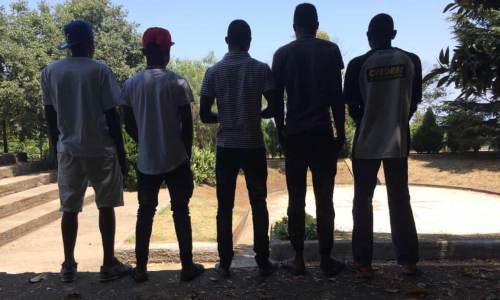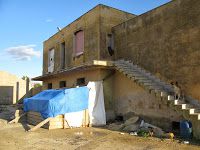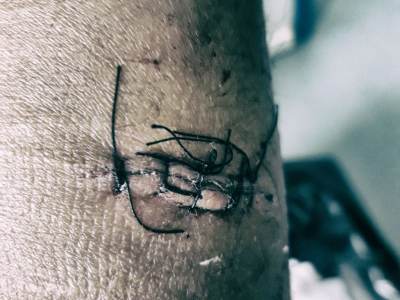New migrant tragedies in front of the Lybian coast. The patrol boats given to Gaddafi have turned their motors off.
We’ve said it time and time again, but no one ever listens. The Immigration Emergency has to end (at least on paper) by the 31st December 2012. Reception facilities, which have cost a fortune from the very moment the State of Emergency was declared by Berlusconi in February 2011, will be closed and as for the boats that continue to arrive- we must speak about them as little as possible, the old bilateral agreements still stand.
Now as we approach the end of the year, the migrants still in the reception centres managed by the Civil Protection are about to be thrown back on to the streets. A temporary permit of stay is the best prospect they can hope for. Those being held on Lampedusa will have to wait, sooner or later the police will be given the permission to unearth the usual ringleaders- who will then be transferred elsewhere, or possibly repatriated. This is exactly what has been happening in recent months and the general public are not being informed even in the slightest. It is likely due to the upcoming elections where topics such as immigration and asylum can only lose votes. Yet tragedies involving illegal immigration still occur and not only in the Mediterranean. Yet it would appear “people” in the midst of an economic crisis have become used to such images. Not even floating dead bodies provoke reactions stronger than superficial pity.
Two months ago we wrote about the disaster that occurred just off the island of Lampione, near Lampedusa: “Despite all the confusion surrounding this tragedy, it now seems clear that the control and rescue operations, initially deployed in an area covering up to 60 miles south of Lampedusa, are now being carried out only in close proximity to the Pelagie islands.
Lampedusa officially gained the title of “unsafe port” in September 2011 by the Captain of the Port Authorities, under the strong pressure of the then Minister of the Interior, Roberto Maroni. Consequently, the fleet of ships based in Lampedusa, the majority of which was used to transfer migrants to Porto Empedocle (Agrigento), was moved further north, close to the border with international waters. The lack of ships on the island meant that it became easier for boats bringing migrants from North Africa to reach Italian shores. The boats transporting migrants are often fishing boats which seem to have little difficulty avoiding Lybian or Tunisian surveillance. Furthermore, it now takes longer to reach (and to save) the migrants finding themselves in danger in international waters while making their crossing towards the ‘fort’ of Europe.
This was apparent in the case which took place on Thursday 6th September. From the moment the alarm was raised to the arrival of the rescue teams, several hours passed. The situation was further complicated by the onset of nightfall which made search operations more difficult. It is possible that enabling the Lybian and Tunisian authorities to intercept migrants escaping towards Europe has resulted in a less demanding role for the Italian authorities in the surveillance of the international waters south and west of Lampedusa. And it would appear that there are positive effects with boat arrivals falling by 90%. But the reason for this decline is certainly not due to the fact that Lampedusa has been declared an “unsafe port”. Such a decision is at any rate completely unfounded from a technical point of view. How can it be possible to qualify a mooring place as “unsafe” when over the years it has enabled tens of thousands of lives to be saved? The port’s status was downgraded due to the burning down (in September 2011) of the First Reception Centre (CSPA) which occurred during a migrant protest. Yet the fact that the CSPA had been inappropriately transformed into a Detention Centre and the fact that the migrants were being illegally held there for weeks, seem to be omitted from any justification of “unsafe port” status.
In reality, according to the ANCUR report from 30th June 2012, the majority of boats leaving Lybia are now intercepted by the Lybian authorities according to the working protocols in force and also in collaboration with the Maltese and Italian military. The report also includes cases of Tunisian and Algerian boats being stopped by the military and being taken back to the ports of their departure. Following the harsh condemnation by the European Court of Human Rights for the collective refoulements to Lybia which took place on the Italian Finance Police’s ship Bovienza on the 6th May 2009, the “dirty work” of blocking the migrants at sea and forcefully redirecting them back to the port which they came from, has now been externalised as a result of the latest bilateral agreements between Lybia and Tunisia. What happened in front of the cliffs of Lampione (Lampedusa was in sight when the sinking took place) serves as a reminder of what the Italian Minister of the Interior, Cancallieri has put forward on many occasions, that every country touching the Mediterranean has to be responsible for the surveillance of its own waters in order to tackle illegal immigration into Europe. And with these working profiles, emergency service cooperation agreements still seem to be in force between the Lybian, Tunisian, Algerian and Italian authorities.”
Now the Italian Navy ships have been deployed further south, or at any rate they are on standby ready to intervene in Lybian waters. It is also possible that this move has been made in order to protect the fishing vessels of Mazara del Vallo, at least six of which have disappeared in the course of 2012. Those responsible are believed to be Lybians and Tunisians who took the opportunity when the Italian patrol boats were relocated further north and patrols were consequently limited to the border of Italian waters with international waters, about 24 miles south of Lampedusa. Anyway, the Maltese authorities continue to not interfere, even when their radars are the first to discover a vessel sailing towards Sicily. The boat arrivals which took place in the past few weeks (during October), or rather, the successful sea rescues, which seem to be occurring further and further south of Lampedusa (up to 30-40 miles off the Lybian coast which corresponds to 130 miles south of Lampedusa) indicate that another change has taken place: boats leaving from Lybia have started up again, and what’s more, the Lybian authorities are no longer doing anything to block the vessels laden with refugees whilst they are still in their own territorial waters. This could be connected to the recent climate of instability that seems to have emerged in Lybia with reports of violent clashes between various factions. It is a situation which sees the migrants as victims who are earmarked, especially those with black skin who can easily be mistaken for mercenaries who fought for Gaddafi. They undergo a brief trial that may even result in a public execution. And despite the situation in Lybia, the closure of the Coucha refugee camp on the border between Lybia and Tunisa, has forced many migrants who had been denied international protection to return to Lybia and to reattempt entry to Europe by crossing the sea. More and more often this seems to be occurring at the cost of lives. It is no coincidence that those who have recently been arriving from Lybia are largely Somalis and migrants from the Horn of Africa (Eritrea, Ethopia), while the Nigerians, the Ghanaians and generally all migrants from subSaharan Africa seem to have disappeared. Only those who the Lybian military are allowing to leave are arriving. Meanwhile the modest but constant flux of Tunisians continues and they continue to be blocked for indefinite periods of time in the Lampedusa First Reception Centre (CSPA) or in other unofficial centres, without any respect for the procedures outlined by law or the Schengen Border Agreement. The two weekly flights from Palermo’s Punta Raisi airport continue to take off for Tunisia in order for migrants to be quickly repatriated, without undergoing procedures of individual identification, under the agreement made by Maroni in Tunisia on 5th April 2011.
The Italian military must undoubtedly receive merit for continuing to go further and further south to save lives and to protect the fishermen who operate in international waters. It is these very waters that Lybia claim are their responsibility, up to 70 miles offshore. Yet, in addition to this, it is necessary to ask the Italian government to put a stop to police practices of prolonged holding or, better still, to halt all the completely unofficial practices which migrants are subjected to after being brought ashore after a rescue operation. These are rescue operations which garner admiration from the rest of the world, who remain unaware of what happens afterwards. And the agreements with Lybia should be renegotiated, putting the care of the human life at sea back in first place and not that of illegal immigration, which seems to be the current priority under the verbal agreement made between the Minister of the Interior, Cancellieri and her Lybian counterpart on the 3rd April 2012. It was a meeting which served to confirm, apart from the refoulements which had been condemned by the European Court of Human Rights with the ruling on the Hirsi case in February of this year, the protocols in operation and the common chain of command (agreed with Lybian officials by Amato and Manganelli in November 2007 and later reciprocated in the Friendship Treaty signed by Berlusconi and Gaddafi in August 2008). Yet even though it is no secret that practically all of those who arrive from Lybia are potential asylum seekers, in recent days the government have taken the situation in hand by adopting a measure which entails the territorial commission to re-evaluate all rejection cases and attribute refugees arriving from Lybia with a protection status. It is a provision which has not only made those involved waste a huge amount of time and cost an incredible amount of public spending money, but it has also made it even more difficult to allow for integration and instead created a situation of malice and frustration.
The recurring tragedies have imposed a swing in migratory politics on an international level. It is necessary to take a second look at relations with Malta, the country with the largest (SAR) zone of search and rescue in the south of Europe. Malta has to become a point of rescue and arrival equal to Lampedusa. It cannot simply transmit the alarm calls it receives and carry out the necessary follow up communication, which can lead to precious hours of rescue time being lost. It is obvious that Malta cannot take in all the survivors of shipwrecks that arrive from Lybia, two thousand people on such a small island, as this year’s figures stand, would correspond to the arrival of two hundred thousand migrants in Italy. Furthermore, on a European level, it is necessary to guarantee everyone a place of safety, a safe port, to arrive in after rescue operations have taken place (also with alternative methods other than those incorporated by Frontex). In the language of international conventions, ‘a safe port’ means a place where the fundamental rights of the people will be respected, where the right to protection means something. It does not simply mean the nearest port. Rapid procedures of transfer from Malta to other European countries should be included. It is clear that it is not possible to remove the obligations of rescue and protection that descend from international conventions. This is especially true in a moment where the situation in North African countries does not allow for any form of indiscriminate refoulement or readmission procedures based on bilateral agreements. It is important to remember that these are agreements which were stipulated by transitional governments and even though the process is somewhat tiresome and often problematical, new governments are now being formed. They are part of political processes which are being completely ignored in Europe and drastic consequences are soon likely to follow, not only for migrants, but for all citizens of Europe.
Fulvio Vassallo Paleologo
University of Palermo



